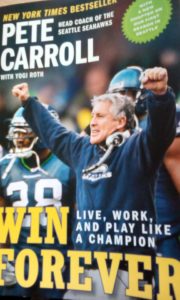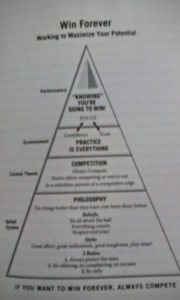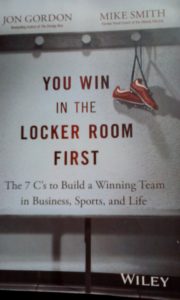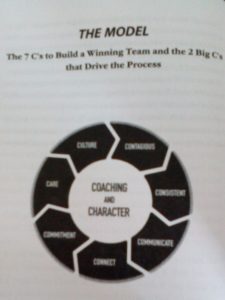Main Menu
Latest Blog Entry
User login
Coaching Philosophy: Book Reviews
When delivering strength and conditioning coaching courses, we always discuss coaching philosophy and how to develop a club culture. Two books I have read this year have helped with this process, both by NFL coaches. Here is a brief review of both.
Win Forever by Pete Carroll (recommended by Mike Bahn)
 A frank and revealing tale of how Pete Carroll developed his coaching philosophy. Fired by the New York Jets and the New England Patriots, Carroll has gone on to be a very successful college coach at USC and is now with the Seattle Seahawks.
A frank and revealing tale of how Pete Carroll developed his coaching philosophy. Fired by the New York Jets and the New England Patriots, Carroll has gone on to be a very successful college coach at USC and is now with the Seattle Seahawks.
His philosophy was developed in response to adversity, rather than through unparalleled success from the start. As you can see from this picture, the philosophy starts with some simple rules: no whining, no excuses and be early.
It then expands into style of play and practice and beliefs.
When these foundations are in place, the focus on competing emerges with a “relentless pursuit of a competitive edge”.
Where the book might be useful to coaches and people outside of sport is in the application of this philosophy and making the athlete accountable.
 “It’s the individual himself who ultimately is the only one who has the power to develop his fullest potential.”
“It’s the individual himself who ultimately is the only one who has the power to develop his fullest potential.”
“Getting that across to players is a constant occupation. You have to continually encourage people to the point where they feel empowered to call the shots that will position them to become the best they can be. It’s not any one specific thing but rather than an ongoing process of showing them what they’re capable of.”
I find this is the differentiation between talk and action when trying to implement a philosophy.
Carroll goes on to use words like discipline, effort and diligence in a reminder of what it takes to get it done.
Two years ago a lot of coaches were waving “Legacy” around as a good book, I wonder how many of them have implemented and stuck to a coaching philosophy since?
You Win in the Locker Room First by Jon Gordon and Mike Smith
 I have lent this book to several other coaches as a really quick read with good ideas. Mike Smith was coach of the Atlanta Falcons and Jon Gordon has written “The energy bus”.
I have lent this book to several other coaches as a really quick read with good ideas. Mike Smith was coach of the Atlanta Falcons and Jon Gordon has written “The energy bus”.
Together they have written a simple but very clear guide to building a winning team by establishing the right culture.
“Culture drives expectations and beliefs. Expectations and beliefs drive behaviours. Behaviours drive habits and habits drive the future.”
There are 8 chapters, with the first 7 each expanding on a word beginning with C that underpins the culture. It is a bit of an artificial premise, but helps with recall.
For example, the chapter on consistency explains why this is important in coaching.
“If you are not consistent, you will lose the trust your team has in you. When you lose trust, you lose the locker room.”
Players and other coaches need to know that you can be relied upon rather than erratic. Consistently being humble and hungry are important whether you are winning championships or trying to avoid relegation.
Consistency applies to players too who are expected to be stable personalities rather than moody (or at least maintain stable behaviours around their team mates).
The book is littered with anecdotes from the NFL to illustrate the points made in each chapter. Good practice and problem areas are covered, Smith is very good at sharing his shortcomings or mistakes that he has made. This makes for an entertaining and enlightening read.
The chapters have bullet point summaries, plus easily remembered quotes, which make re reading and revising easier.
“To be a great leader, coach and team member you must be more than involved- you must be committed. Your team has to know that you are committed to them before they will commit to you.”
Highly recommended.
See the full list of best coaching books
Client Testimonials
 Vern Gambetta: GAIN founder
Vern Gambetta: GAIN founder
James Marshall is the consummate professional, always learning and working to make himself better. His focus is always on the athletes he working to make them better by exploring and discovering the dimensions of movement. He is a longtime active member of the GAIN professional development network. This gives him access to other professionals around […]
More

